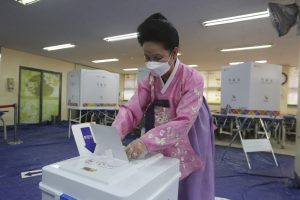In recent years, there have been growing suspicions among South Korean online users over China’s interference operations in the country. Although the issue has attracted quite a bit of online discussion, it has never broken into a mainstream debate in South Korea.
That might change soon, however, with the latest suspicions raised by Min Kyung-wook, a journalist-turned-politician with the country’s conservative United Future Party (UFP), the main opposition party. His name is currently dominating trending keyword boards of main internet portal websites in South Korea. Min caught public attention after he claimed that the result of the latest election in South Korea was manipulated.
Min presented crushed ballots found near one of the polling stations after the election was over as evidence to back his claim. Some of them are believed to be stamped by the authorities, which indicates they were used during the vote.
South Korean prosecutors are currently investigating Min to find out how and when he obtained such ballots.
Adding spice to the accusations, Min is also claiming Chinese involvement in the alleged election fraud.
Min cited the fact that ballots were sorted by machines that were connected online, which allowed operators to communicate with outsiders. He believes this opened the door to Chinese interference.
According to Min, hackers were able to move around votes to areas with favorable candidates through computer manipulation.
Min claimed to have analyzed the sequence of processed data during the election and discovered a pattern that reads “Follow the party.” He claimed that this refers to China’s Communist Party, adding that he is ready to reveal more evidence to prove Beijing’s interference with South Korea’s election.
Not all agree with Min. In particular, fellow UFP member Ha Tae-kyung was among those who hit hard back at Min.
Accusing him of “being delusional,” Ha urged the UFP to kick Min out before he further hurts the reputation of the party.
“Min is making the UFP as a laughing stock,” Ha said. “In order for the online and offline rigged elections he claimed to be possible, at least tens of thousands of people, including government agencies in South Korea and China, must conspire very elaborately and systematically. It is impossible in South Korea.”
“His claim is merely dividing the party, hindering innovation, turning the party a mockery of the people and an international disgrace, and dragging the party and overall conservatives into a quagmire that completely destroys them,” Ha lamented.
Yu Kyong-jun, another member of the UFP who used to lead Statistics Korea, also questioned the credibility of Min’s claim. In particular, Yu said it is premature to conclude that there was manipulation in the local election based on Min’s claim citing a study by Walter Mebane, a University of Michigan professor of political science and statistics and an expert on detecting electoral fraud.
Min cited Mebane’s study as one piece of evidence to back his claim. Yu said that it is difficult to apply Mebane’s study to South Korea’s election system and that the study itself has many loopholes.
Despite backlash from his colleagues, Min seems to be very determined to continue his crusade, and his claim is also rapidly gaining attention from online users in the country.
In particular, online users are curious if there are ways to confirm the charges of China’s interference with the local election — not to mention the message Min claimed to have found.
While Min vowed to bring this matter to the prosecutors and have them launch an official investigation, the authorities are currently focusing on how and when Min obtained crushed ballots that are believed to have been used during the election.
Under current regulations, those who smuggle, damage, or steal ballots could face up to 10 years in prison or a fine of up to 30 million South Korean won ($24,250).

































